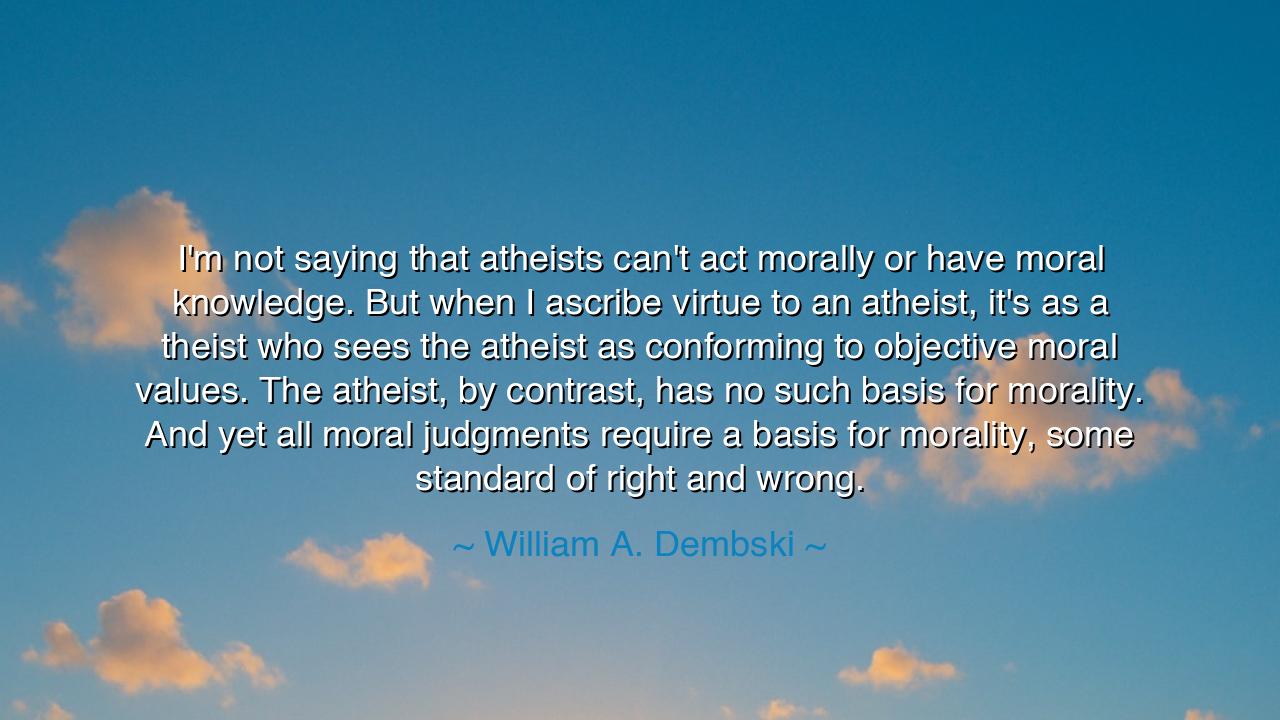
I'm not saying that atheists can't act morally or have moral
I'm not saying that atheists can't act morally or have moral knowledge. But when I ascribe virtue to an atheist, it's as a theist who sees the atheist as conforming to objective moral values. The atheist, by contrast, has no such basis for morality. And yet all moral judgments require a basis for morality, some standard of right and wrong.






The words of William A. Dembski rise from the long river of human reflection upon good and evil: “I’m not saying that atheists can’t act morally or have moral knowledge. But when I ascribe virtue to an atheist, it’s as a theist who sees the atheist as conforming to objective moral values. The atheist, by contrast, has no such basis for morality. And yet all moral judgments require a standard of right and wrong.” Here, Dembski wrestles with the timeless question: where does morality come from? Is it the breath of heaven, descending upon the human heart, or is it a construction of the mind, shifting with culture and time? He declares that without a divine standard, morality drifts like a ship without anchor, carried by the winds of opinion.
From the days of the ancients, this debate has echoed. Plato spoke of the “Form of the Good,” a transcendent reality by which all actions were measured. Augustine of Hippo declared that goodness itself is rooted in God, and that to turn from Him is to fall into corruption. Others, like the Stoics, believed in a moral order written into the fabric of nature, accessible to reason. Dembski stands with the tradition that holds objective moral values are not born of human preference, but of something greater, higher, eternal. For to call something truly evil—slavery, genocide, cruelty—requires more than saying, “we dislike it.” It requires a standard that binds all, regardless of belief.
Consider the horrors of the Nuremberg Trials after the Second World War. The defeated Nazis declared, “We followed our nation’s laws.” But the judges replied that there is a law higher than the decrees of men—a universal standard of right and wrong. Without such a foundation, there could be no justice. If morality were merely human convention, then even the most terrible atrocities could be justified under the cloak of culture. Yet humanity cried out that there is a higher law, one that transcends borders, beliefs, and times. This is the very point Dembski emphasizes: that moral judgments demand a ground deeper than personal or social opinion.
And yet, he acknowledges that atheists can act with virtue, kindness, courage, and justice. History abounds with examples: men and women without faith in God who nonetheless sacrificed for the good of others. But Dembski’s claim is not that they cannot act morally, but that they cannot explain, in ultimate terms, why such acts are truly good. To the theist, their deeds conform to the eternal standard, even if they do not recognize its source. To the atheist, the foundation lies in human reason, emotion, or survival—but these, says Dembski, lack the power to make moral truth binding for all.
O seekers of wisdom, understand this tension: morality is not proved merely by conduct, but by foundation. A building may stand for a time even if its pillars are weak, but in the storm it will fall. So too, a morality not rooted in something unchanging may endure for a season, but will it survive when tested by extremity, when the world tempts men to justify evil in the name of power? The ancients believed that without a higher light to guide them, people walk in darkness, calling evil good and good evil.
The lesson for us is not to despise those of differing belief, but to reflect deeply on our own basis for morality. Do we act kindly because it feels pleasant, or because it is eternally right? Do we reject cruelty because society frowns upon it, or because it violates the very structure of truth? Each man and woman must answer where their standard lies, lest they drift unknowingly upon shifting sands.
Practical action is before us: study the teachings of wisdom, examine the roots of your convictions, and live by a code that does not change with the fashions of the day. If you are a theist, anchor your moral judgments in the eternal standard you confess. If you are an atheist, ask yourself whether the values you hold can endure when stripped of comfort, when tested by suffering, when demanded by justice. Above all, act with integrity, for virtue shines brightest when it is lived, not merely spoken.
Thus remember Dembski’s words: “All moral judgments require a basis for morality, some standard of right and wrong.” Without such a standard, life becomes a contest of preferences; with it, life becomes a path of meaning. Choose your foundation wisely, for upon it rests not only your choices but the destiny of the generations to come.






AAdministratorAdministrator
Welcome, honored guests. Please leave a comment, we will respond soon